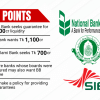Private credit growth surges, nears Bangladesh Bank target

Bangladesh's private sector credit growth surged to 14.07 per cent in August, almost touching the central bank's target for the entire fiscal year, an ominous sign for the economy since it may stoke inflationary pressures.
When the Bangladesh Bank unveiled its monetary policy for 2022-23 in June, it called the stance contractionary. But the ongoing credit expansion in the private sector does not bode well for the central bank's stance aimed at reining in inflation.
The BB has set a private credit growth goal of 14.1 per cent for the fiscal year after it expanded by 14.5 per cent the year before. The credit growth has kept rising since March, data from the BB showed.
Analysts say that the contractionary monetary policy is not working owing to the interest rate cap of 9 per cent on loans. A higher credit growth means the money supply is on the rise, which will ultimately put an adverse impact on price pressures.
In July, inflation fell to 7.48 per cent from a nine-year high of 7.56 per cent in June.
The government has not published the inflation figure for August. However, Planning Minister MA Mannan signalled earlier this month that inflation would go up in August and September owing to the hike in the cost of living and the ongoing Russia-Ukraine war.
Monzur Hossain, research director of the Bangladesh Institute of Development Studies, said: "The central bank has taken a contractionary monetary policy to squeeze the private sector credit growth given the inflationary pressure."
"But the stance to reduce the money supply is not bringing about expected output thanks to the interest rate cap on lending. There is little scope to follow a contractionary monetary policy by maintaining the cap."
Owing to the interest rate ceiling, businesses have continued to take up a hefty amount of loans.
"So, the central bank should reduce the money supply by lifting the cap, or else it may fuel the inflationary pressure further," Hossain said.
The central bank hiked the benchmark interest rate by 75 basis points to 5.50 per cent in May in order to tighten the money supply. A spike in policy rates makes loans costlier.
Commercial banks follow it to fix the interest rates on both loans and deposits. Quoting the policy rate, cash-strapped banks take short-term loans from the BB before disbursing them among individual borrowers.
But the policy has become ineffective to contain inflation due to the lending cap.
"No tool of the monetary policy can contain inflation unless the lending cap is withdrawn," said Hossain.
The economist, however, noted that if the loans given by banks go to the productive sector, people would be able to absorb the price pressure.
"Expansion of the productive sector also creates more jobs. But inflation will go up if funds are given to consumers."
Ahsan H Mansur, executive director of the Policy Research Institute of Bangladesh, thinks the credit growth would have jumped to a large degree had banks sat on excess funds.
"Funds disbursed by banks are cheaper given the interest rate cap on loans," he said.
A large amount of the local currency has been mopped up by the central bank through the injection of US dollars into the economy since the last fiscal year as banks need the American greenback to settle import bills.
The central bank supplied a record $7.62 billion to the market in the last fiscal year and more than $3 billion this fiscal year so far.
Escalated import bills have driven up the credit growth, said an economist of the BB.
Imports surged to $5.86 billion in July, up 23.2 per cent from a year prior, owing to higher costs of commodities amid pent-up demand, supply shocks and the global energy crisis.
Emranul Huq, managing director of Dhaka Bank, said many importers are clearing import bills while opening letters of credit to avert any loss from the exchange rate fluctuation.
"They make the payments by taking loans in the form of post-import financing from banks. This has given a boost to the private sector credit growth."
This is because the taka has lost its value by 25 per cent in the past one year amid a shortage of the US dollar, which traded at Tk 105.35 yesterday.
The local currency may weaken further since the global supply chain disruption continues amid the dragging war.
Consumer financing is on the increase despite the price hike of goods and services, pushing up the credit growth, Huq said.
"We have to contain the consumer financing, otherwise the banking sector may face liquidity stress."

 For all latest news, follow The Daily Star's Google News channel.
For all latest news, follow The Daily Star's Google News channel. 








Comments